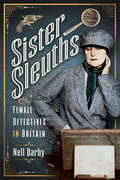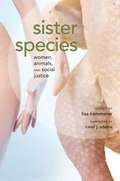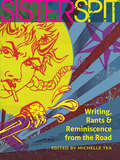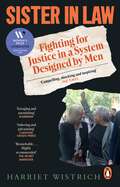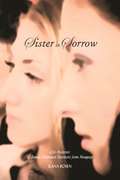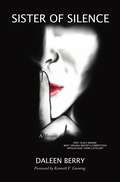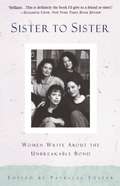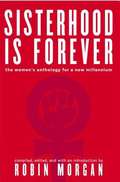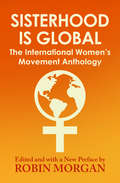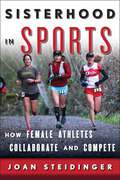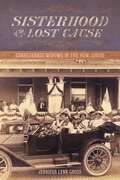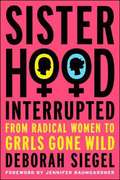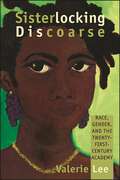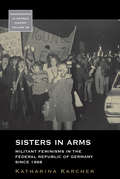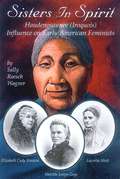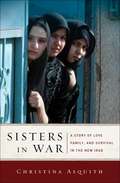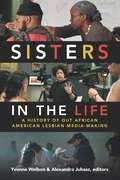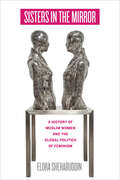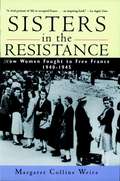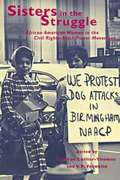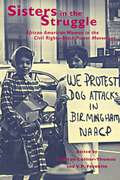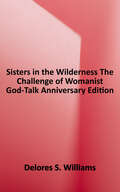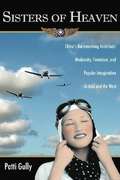- Table View
- List View
Sister Sleuths: Female Detectives in Britain (Trailblazing Women)
by Nell Darby“A unique and inherently fascinating history that brings a particular aspect of the role of women in law enforcement up out of obscurity.” —Midwest Book ReviewThe 1857 Divorce Act paved the way for a new career for women: that of the private detective. To divorce, you needed proof of adultery—and men soon realized that women were adept at infiltrating households and befriending wives, learning secrets and finding evidence. Over the course of the next century, women became increasingly confident in gaining work as private detectives, moving from largely unrecognized helpers to the police and to male detectives, to becoming owners of their own detective agencies. In fiction, they were depicted as exciting creatures needing money and work; in fact, they were of varying ages, backgrounds and marital status, seeking adventure and independence as much as money. Former actresses found that detective work utilized their skills at adopting different roles and disguises; former spiritualists were drafted to denounce frauds and stayed to become successful private eyes; and several female detectives became keen supporters of the women’s suffrage movement, having seen for themselves how career-minded women faced obstacles in British society.Sister Sleuths seeks to shed light on the groundbreaking women who have worked over the past century and a half to uncover wrongdoing and solve crimes.“The book is well-researched and provides numerous examples of women who either dabbled in investigation or made it their life’s work.” —Historical Novel Society“Absolutely enthralling stuff.” —Books Monthly
Sister Species: Women, Animals and Social Justice
by Carol J. Adams Lisa A. KemmererSister Species: Women, Animals, and Social Justice addresses interconnections between speciesism, sexism, racism, and homophobia, clarifying why social justice activists in the twenty-first century must challenge intersecting forms of oppression. This anthology presents bold and gripping--sometimes horrifying--personal narratives from fourteen activists who have personally explored links of oppression between humans and animals, including such exploitative enterprises as cockfighting, factory farming, vivisection, and the bushmeat trade. Sister Species asks readers to rethink how they view "others," how they affect animals with their daily choices, and how they might bring change for all who are abused. These essays remind readers that women have always been important to social justice and animal advocacy, and they urge each of us to recognize the links that continue to bind all oppressed individuals. The astonishing honesty of these contributors demonstrates with painful clarity why every woman should be an animal activist and why every animal activist should be a feminist. Contributors are Carol J. Adams, Tara Sophia Bahna-James, Karen Davis, Elizabeth Jane Farians, Hope Ferdowsian, Linda Fisher, Twyla François, Christine Garcia, A. Breeze Harper, Sangamithra Iyer, Pattrice Jones, Lisa Kemmerer, Allison Lance, Ingrid Newkirk, Lauren Ornelas, and Miyun Park.
Sister Spit
by Michelle Tea"Heartbreakingly beautiful writing; sometimes funny, sometimes shattering-always revolutionary. Truly amazing collection!"--Margaret Cho"Sister Spit is like the underground railroad for burgeoning queer writers. Not only in the van, but in the audiences trapped in the hinterlands of America and looking to escape. Sister Spit saves lives."--Justin Vivian Bond, author of TANGO: My Childhood, Backwards and in High HeelsA collection of writing and artwork from the irreverent, flagrantly queer, hilariously feminist, tough-talking, genre-busting ruffians who have toured with the legendary Sister Spit. Co-founded in 1997 by award-winning writer Michelle Tea, Sister Spit is an underground cultural institution, a gender-bending writers' cabaret that brings a changing roster of both emerging writers and some of the most important queer and counterculture artists of the day to universities, art galleries, community spaces, and other venues across the country and worldwide.Sister Spit: Writing, Rants and Reminiscence from the Road captures the provocative, politicized, and risk-taking elements that characterize the Sister Spit aesthetic, stamping the raw energy and signature style of the live show onto the page. Bratty poets and failed priestesses, punk angst and tough love, too much to drink and tattooed timelines-this anthology captures it all in a collection of poetry, personal narrative, fiction, and artwork. Featuring a who's who of queer and queer-centric writers and artists, the collection functions as a travelog, a historical document, and a yearbook from irreverent graduates of the school of hard knocks.Eileen Myles * Beth Lisick * Michelle Tea * MariNaomi * Cristy Road * Ali Liebegott * Blake Nelson * Lenelle Moise * and Many More!
Sister in Law: Shocking true stories of fighting for justice in a legal system designed by men
by Harriet WistrichLONGLISTED FOR THE 2025 WOMEN'S PRIZE FOR NON-FICTIONDiscover the essential, must-read book about how the UK legal system is failing women, as told by one of Britain’s foremost lawyers.'This is a brilliant and important book. Harriet is a trailblazer and has done so much to get justice for so many women.' - Victoria Derbyshire'Compelling, inspiring, horrifying and humbling in equal measure. Everybody should read it.' - Professor Dame Sue Black, author of All That Remains‘Every feminist should know Harriet Wistrich’s name. There is no one better to learn from if you want to Get Shit Done.’ - Helen Lewis, author of Difficult Women'A shocking, sobering and galvanising account of her astonishing legal career fighting for women in a legal system that is all too often stacked against them' - Caroline Criado Perez*****For more than quarter of a century, Harriet Wistrich has fought the corner of people from all walks of life let down by our justice system.She has been at the forefront of some historic and ground-breaking legal victories, from helping the victims of taxi driver and serial rapist John Worboys, to representing a pioneering group of the women caught up in the ‘spy cops’ scandal – women deceived into forming long-term relationships with men later revealed to be undercover police officers.Litigation can be a long and rocky path of pitfalls and dead ends and there are defeats as well as gains, hours of painstaking work as well as courtroom drama.It takes collaboration, extraordinary tenacity and huge compassion, but Harriet Wistrich is proof that it is possible to demand better justice and to bring about important change.Exploring landmark cases, Sister in Law covers the shocking true stories demonstrating that, terrifyingly often, the law is not-fit-for-purpose for half the population and shines a feminist light on the landscape of arcane laws and systems skewed towards men.*****Praise for Sister in Law:‘Shocking, compelling and invigorating... A must read from one of the foremost feminist human rights lawyers today' Keina Yoshida & Jen Robinson'A brilliant lawyer. A brilliant book' - Baroness Helena Kennedy KC'Harriet's innovative, intense and courageous commitment to safeguarding basic rights, is compellingly set out in every chapter.' - Michael Mansfield KC‘A vivid account of cases in which the justice system has spectacularly failed women but also of how injustices can be challenged if only we know enough and care enough to do so.’ - Rt Hon Lady Hale DBE'If I was ever in trouble, I would want Harriet Wistrich fighting in my corner.' - Emeritus Professor David Wilson, author of My Life with Murderers
Sister in Sorrow: Life Histories of Female Holocaust Survivors from Hungary
by Ilana RosenSister in Sorrow offers a glimpse into the world of Hungarian Holocaust survivors through the stories of fifteen survivors, as told by thirteen women and two spouses presently living in Hungary and Israel. Analyzing the accounts as oral narratives, author Ilana Rosen uses contemporary folklore studies methodologies to explore the histories and the consciousness of the narrators as well as the difficulty for present-day audiences to fully grasp them. Rosen's research demonstrates not only the extreme personal horrors these women experienced but also the ways they cope with their memories. In four sections, Rosen interprets the life histories according to two major contemporary leading literary approaches: psychoanalysis and phenomenology. This reading encompasses both the life spans of the survivors and specific episodes or personal narratives relating to the women's identity and history. The psychoanalytic reading examines focal phases in the lives of the women, first in pre-war Europe, then in World War II and the Holocaust, and last as Holocaust survivors living in the shadow of loss and atrocity. The phenomenological examination traces the terms of perception and of the communication between the women and their different present-day non-survivor audiences. An appendix contains the complete life histories of the women, including their unique and affecting remembrances. Although Holocaust memory and narrative have figured at the center of academic, political, and moral debates in recent years, most works look at such stories from a social science perspective and attempt to extend the meaning of individual tales to larger communities. Although Rosen keeps the image of the general group--be it Jews, female Holocaust survivors, Israelis, or Hungarians--in mind throughout this volume, the focus of Sister in Sorrow is the ways the individual women experienced, told, and processed their harrowing experiences. Students of Holocaust studies and women's studies will be grateful for the specific and personal approach of Sister in Sorrow.
Sister of Silence
by Daleen BerryForced into a shotgun wedding after her high school was featured on national television for having the highest number of pregnant teens in the United States, Daleen found herself married to a coal miner who kept her barefoot and pregnant. By age twenty-one she had four children. Sister of Silence is the amazing story of her personal journey, and how she went from being a teen mom to an award-winning journalist determined to break the silence that shatters women and children's lives.
Sister to Sister
by Patricia FosterSister to Sister includes essays and stories by:Meena AlexanderRobin BehnLouise DeSalvoErika DuncanMaria FlookPatricia FosterBonnie FriedmanDonna GordonLucy GrealyJoy HarjoBell HooksPam HoustonJesse Lee KerchevalLori Hope NorrisLetty Cottin PogrebinMona Simpson Debra SparkJoan WickershamJoy Williams
Sisterhood Is Forever: The Women's Anthology for a New Millennium
by Robin MorganThis diverse group of contributors spans generations, races, ethnicities and sexual orientations - covering topics from academia to violence against women - and everything in between.
Sisterhood Is Forever: The Women's Anthology for a New Millennium
by Robin MorganThirty years after Robin Morgan's groundbreaking anthology, Sisterhood Is Powerful-- named by The American Librarians' Association one of "The 100 Most Influential Books of the Twentieth Century" -- comes this landmark new collection for the twenty-first century. Sisterhood Is Forever-- with over 60 original essays Morgan commissioned from well-known feminist leaders plus energetic Gen X and Y activists -- is a composite mural of the female experience in America: where we've been, where we are, where we're going.
Sisterhood Is Global: The International Women's Movement Anthology
by Robin MorganA powerful and essential anthology that sheds light on the status of women throughout the world Hailed by Alice Walker as &“one of the most important human documents of the century,&” this collection of groundbreaking essays examines the global status of women&’s experiences, from oppression to persecution. Originally published in 1984, the compilation features pieces written by a diverse set of powerful women—journalists, politicians, grassroots activists, and scholars—from seventy countries. Author Robin Morgan, a champion of women&’s rights herself, expertly weaves these inspiring essays into one comprehensive feminist text. These compelling &“herstories&” contain thoroughly researched statistics on the status of women throughout the world. Each chapter focuses on a different country and includes data on education, government, marriage, motherhood, prostitution, rape, sexual harassment, and sexual preference. Sisterhood Is Global transcends political systems and geographical boundaries to unite women and their experiences in a way that remains unequalled, even decades after its first publication.
Sisterhood in Sports: How Female Athletes Collaborate and Compete
by Joan SteidingerSisterhood in Sports: How Female Athletes Collaborate and Compete tells the stories of all kinds of female athletes in a variety of sports. Their natural tendency to use talking as a primary form of communication is essential to their experiences and successes in sports. Women and girls tend to have BFFs, collaborate during periods of stress, express empathy for one another, worry about themselves and others, and desire to have fun in sports, which makes their experiences of sports and competition different from their male counterparts. Female strengths are grounded in both mind and body, and they take these strengths onto the court, field, and track. There are now dozens of studies showing how the female brain and hormones operate quite differently than those of men. This book reveals the ways in which these differences confirm that intense emotions about relationships are part of the sporting life for female competitors. Joan Steidinger uses real stories to show that women and girls compete at very high
Sisterhood is Powerful: An Anthology of Writings from the Women’s Liberation Movement
by Robin MorganPublished in 1970, this was the first comprehensive collection of writings from the "Women's Liberation Movement" in the United States, including articles, poems, photographs, and manifestos. It is the precursor to Sisterhood Is Global: The International Women's Movement Anthology (1984), and Sisterhood Is Forever: The Women's Anthology for a New Millennium (2003)
Sisterhood of the Lost Cause: Confederate Widows in the New South
by Jennifer Lynn GrossHistorians have thoroughly documented the vast devastation of the Civil War. In the attention they have paid to aspects of that destruction, however, one of the most obvious ramifications appears routinely overlooked—Confederate widowhood. Jennifer Lynn Gross’s Sisterhood of the Lost Cause helps rectify that historical omission by supplying a sweeping analysis of women whose husbands perished in the war.
Sisterhood, Interrupted: From Radical Women To Grrls Gone Wild
by Deborah SiegelContrary to clichés about the end of feminism, Deborah Siegel argues that younger women are reliving the battles of its past, and reinventing it--with a vengeance. From feminist blogging to the popularity of the WNBA, girl culture is on the rise. A lively and compelling look back at the framing of one of the most contentious social movements of our time, Sisterhood, Interrupted exposes the key issues still at stake, outlining how a twenty-first century feminist can reconcile the personal with the political and combat long-standing inequalities that continue today.
Sisterlocking Discoarse: Race, Gender, and the Twenty-First-Century Academy (SUNY series in Feminist Criticism and Theory)
by Valerie LeeFollows a Black woman's forty-year career in academia, sharing how race and gender can disrupt and enhance the professional and the personal, from leadership and policies to family life.Finalist for the 2021 Foreword INDIES Book of the Year Award in the Education CategoryIn Sisterlocking Discoarse, hair is a medium for reflecting on how academic leadership looks, performs, and changes when embodied by a Black woman. In these ten essays, Valerie Lee traverses disciplines and genres, weaving together memoir, literary analysis, legal cases, folklore, letters, travelogues, family photographs, and cartoons to share her story of navigating academia. Lee's path is not singular or linear, but rather communal and circular as she revisits her earliest years in her grandmother's home, advances through the professoriate and senior administration, and addresses her hopes and fears for her own children. Drawing inspiration from the African American storytelling traditions she has spent decades studying and teaching, Lee approaches issues of race, gender, social justice, academic labor, and leadership with a voice that is clear, intimate, and humorous. As she writes in the introduction, "Sisterlocking Discoarse is about braiding and breathing and believing that a Black woman's journey through the academy is important." Lee's journey will appeal to students, faculty, and administrators across fields and institutions who are committed to making higher education more inclusive, while speaking to the experiences of professional women of color more broadly.
Sisters in Arms: Militant Feminisms in the Federal Republic of Germany since 1968 (Monographs in German History #38)
by Katharina KarcherFew figures in modern German history are as central to the public memory of radical protest than Ulrike Meinhof, but she was only the most prominent of the countless German women—and militant male feminists—who supported and joined in revolutionary actions from the 1960s onward. Sisters in Arms gives a bracing account of how feminist ideas were enacted by West German leftist organizations from the infamous Red Army Faction to less well-known groups such as the Red Zora. It analyzes their confrontational and violent tactics in challenging the abortion ban, opposing violence against women, and campaigning for solidarity with Third World women workers. Though these groups often diverged ideologically and tactically, they all demonstrated the potency of militant feminism within postwar protest movements.
Sisters in Spirit: Haudenosaunee (Iroquois) Influence on Early American Feminists
by Sally Roesch WagnerThis book outlines the history of the Haudenosaunee influence on feminists such as Elizabeth Cady Stanton, Lucretia Mott, and Matilda Joslyn Gage.
Sisters in War: A Story of Love, Family, and Survival in the New Iraq
by Christina AsquithCaught up in a terrifying war, facing choices of life and death, two Iraqi sisters take us into the hidden world of women's lives under U.S. occupation. Through their powerful story of love and betrayal, interwoven with the stories of a Palestinian American women's rights activist and a U.S. soldier, journalist Christina Asquith explores one of the great untold sagas of the Iraq war: the attempt to bring women's rights to Iraq, and the consequences for all those involved.On the heels of the invasion, twenty-two-year-old Zia accepts a job inside the U.S. headquarters in Baghdad, trusting that democracy will shield her burgeoning romance with an American contractor from the disapproval of her fellow Iraqis. But as resistance to the U.S. occupation intensifies, Zia and her sister, Nunu, a university student, are targeted by Islamic insurgents and find themselves trapped between their hopes for a new country and the violent reality of a misguided war.Asquith sets their struggle against the broader U.S. efforts to bring women's rights to Iraq, weaving the sisters' story with those of Manal, a Palestinian American women's rights activist, and Heather, a U.S. army reservist, who work together to found Iraq's first women's center. After one of their female colleagues is gunned down on a highway, Manal and Heather must decide whether they can keep fighting for Iraqi women if it means risking their own lives.In Sisters in War, Christina Asquith introduces the reader to four women who dare to stand up for their rights in the most desperate circumstances. With compassion and grace, she vividly reveals the plight of women living and serving in Iraq and offers us a vision of how women's rights and Islam might be reconciled.
Sisters in the Life: A History of Out African American Lesbian Media-Making (a Camera Obscura Book)
by Yvonne Welbon Alexandra JuhaszFrom experimental shorts and web series to Hollywood blockbusters and feminist porn, the work of African American lesbian filmmakers has made a powerful contribution to film history. But despite its importance, this work has gone largely unacknowledged by cinema historians and cultural critics. Assembling a range of interviews, essays, and conversations, Sisters in the Life tells a full story of African American lesbian media-making spanning three decades. In essays on filmmakers including Angela Robinson, Tina Mabry and Dee Rees; on the making of Cheryl Dunye's The Watermelon Woman (1996); and in interviews with Coquie Hughes, Pamela Jennings, and others, the contributors center the voices of black lesbian media makers while underscoring their artistic influence and reach as well as the communities that support them. Sisters in the Life marks a crucial first step in narrating the history and importance of these compelling yet unsung artists. Contributors. Jennifer DeVere Brody, Jennifer DeClue, Raul Ferrera-Balanquet, Alexis Pauline Gumbs, Thomas Allen Harris, Devorah Heitner, Pamela L. Jennings, Alexandra Juhasz, Kara Keeling, Candace Moore, Marlon Moore, Michelle Parkerson, Roya Rastegar, L. H. Stallings, Yvonne Welbon, Patricia White, Karin D. Wimbley
Sisters in the Mirror: A History of Muslim Women and the Global Politics of Feminism
by Elora ShehabuddinA crystal-clear account of the entangled history of Western and Muslim feminisms. Western feminists, pundits, and policymakers tend to portray the Muslim world as the last and most difficult frontier of global feminism. Challenging this view, Elora Shehabuddin presents a unique and engaging history of feminism as a story of colonial and postcolonial interactions between Western and Muslim societies. Muslim women, like other women around the world, have been engaged in their own struggles for generations: as individuals and in groups that include but also extend beyond their religious identity and religious practices. The modern and globally enmeshed Muslim world they navigate has often been at the weaker end of disparities of wealth and power, of processes of colonization and policies of war, economic sanctions, and Western feminist outreach. Importantly, Muslims have long constructed their own ideas about women’s and men’s lives in the West, with implications for how they articulate their feminist dreams for their own societies. Stretching from the eighteenth-century Enlightenment era to the War on Terror present, Sisters in the Mirror shows how changes in women’s lives and feminist strategies have consistently reflected wider changes in national and global politics and economics. Muslim women, like non-Muslim women in various colonized societies and non-white and poor women in the West, have found themselves having to negotiate their demands for rights within other forms of struggle—for national independence or against occupation, racism, and economic inequality. Through stories of both well-known and relatively unknown figures, Shehabuddin recounts instances of conflict alongside those of empathy, collaboration, and solidarity across this extended period. Sisters in the Mirror is organized around stories of encounters between women and men from South Asia, Britain, and the United States that led them, as if they were looking in a mirror, to pause and reconsider norms in their own society, including cherished ideas about women’s roles and rights. These intertwined stories confirm that nowhere, in either Western or Muslim societies, has material change in girls’ and women’s lives come easily or without protracted struggle.
Sisters in the Resistance: How Women Fought to Free France, 1940-1945
by Margaret Collins WeitzSisters in the Resistance renders homage to the courageous women of the French Resistance. It is high time for their contributions to be fully acknowledged, and fortunate indeed that they have found such a sympathetic, scholarly, and lucid chronicler in Margaret Collins Weitz.
Sisters in the Struggle: African American Women in the Civil Rights--Black Power Movement
by Bettye Collier-Thomas V. P. FranklinIn Sisters in the Struggle, we hear about the unsung heroes of the civil rights movements such as Ella Baker, who helped found the Student Non-Violent Coordinating Committee, Fannie Lou Hamer, a sharecropper who took on segregation in the Democratic party (and won), and Septima Clark, who created a network of "Citizenship Schools" to teach poor Black men and women to read and write and help them to register to vote. We learn of Black women's activism in the Black Panther Party where they fought the police, as well as the entrenched male leadership, and the Southern Christian Leadership Conference, where the behind-the-scenes work of women kept the organization afloat when it was under siege. It also includes first-person testimonials from the women who made headlines with their courageous resistance to segregation—Rosa Parks, Charlayne Hunter-Gault, and Dorothy Height.
Sisters in the Struggle: African American Women in the Civil Rights-Black Power Movement
by Bettye Collier-Thomas V.P. FranklinThe rarely heard stories of the brave African American women at the forefront of the Civil Rights Movement. Sisters in the Struggle tells the stories and documents the contributions of African American women to the most important social reform in the United States in the twentieth century. Only recently have historians and other researchers begun to recognize black women&’s central role in the battle for racial and gender equality. These essays describe the early ideological development of Ella Baker, who helped found the Student Nonviolent Coordinating Committee in 1960; Fannie Lou Hamer&’s use of personal anguish to mold her public persona; and Septima Clark&’s creation of a network of &“Citizenship Schools&” to teach poor black southerners to read and write to help them register to vote. We learn of black women&’s activism in the Mississippi Freedom Democratic Party, the Black Panther Party, and the Free Joan Little Movement in the 1970s. It also includes personal testimonies from women who made headlines with their courageous resistance to racism and sexism—Rosa Parks, Charlayne Hunter Gault, and Dorothy Height. Sisters in the Struggle presents a detailed analysis of the multifaceted roles played by women in civil rights and Black Power organizations, as well as the major political parties at the local, state, and national levels, while documenting the formation of a distinct black feminist consciousness. It represents the coming of age of African American women&’s history and presents new studies that point the way to future research and analysis. Contributors: Bettye Collier-Thomas, Vicki Crawford, Cynthia Griggs Fleming, V. P. Franklin, Charlayne Hunter-Gault, Farah Jasmine Griffin, Duchess Harris, Sharon Harley, Dorothy I. Height, Chana Kai Lee, Tracye Matthews, Genna Rae McNeil, Rosa Parks, Barbara Ransby, Jacqueline A. Rouse, Elaine Moore Smith, and Linda Faye Williams
Sisters in the Wilderness: The Challenge of Womanist God-talk
by Dolores S. WilliamsThis landmark work first published 20 years ago helped establish the field of African-American womanist theology and is widely regarded as a classic text. Drawing on the biblical figure of Hagar mother of Ishmael, cast into the desert by Abraham and Sarah, but protected by God Williams finds a proptype for the struggle of African-American women. African slave, homeless exile, surrogate mother, Hagar's story provides an image of survival and defiance appropriate to black women today. Exploring the themes implicit in Hagar's story poverty and slavery, ethnicity and sexual exploitation, exile, and encounter with God Williams traces parallels in the history of African-American women from slavery to the present day. A new womanist theology emerges from this shared experience, from the interplay of oppressions on account of race, sex and class. Sisters in the Wilderness offers a telling critique of theologies that promote liberation but ignore women of color. This is a book that defined a new theological project and charted a path that others continue to explore.
Sisters of Heaven
by Patti GullyIn the late 1930s, as the world moved closer to war, three vivacious Chinese women defied gender perceptions by becoming pilots. Driven by a fierce independent spirit, they realized their dream of flying, completed barnstorming goodwill missions across the Western Hemisphere, and captured the imagination of all those whose lives they touched.They were Hilda Yan, once China's representative at the League of Nations; Li Xiaqing, known as film actress Li Dandan before becoming China's "First Woman of the Air"; and Jessie Zheng, the only commissioned female officer in the Chinese Air Force.In a story almost forgotten to history, Patti Gully's exhaustive research delves into the personal lives of these women, uncovering their fascinating personalities, loves, passions, and above all their overwhelming sense of patriotism and duty. In a time when no Chinese woman could even drive a car, these aviatrixes used flight as a metaphor for their own freedom as well as a symbol of empowerment.Gully shows how, despite their success, their relationships with men were checkered and stormy, leaving behind the wreckage of broken marriages and the children they abandoned--the price they ultimately paid to realize their dream of flying.With an uncanny eye for detail and technical accuracy, Sisters of Heaven offers a rare look at a lost era in aviation history, gender studies, and the history of China and the West. Patti Gully is a graduate of the University of Winnipeg. She holds a BA in arts with an emphasis on English, religious studies, and classics. She also holds an MLIS from the University of British Columbia. She is an amateur pilot and aviation history scholar and lives in Vancouver.
